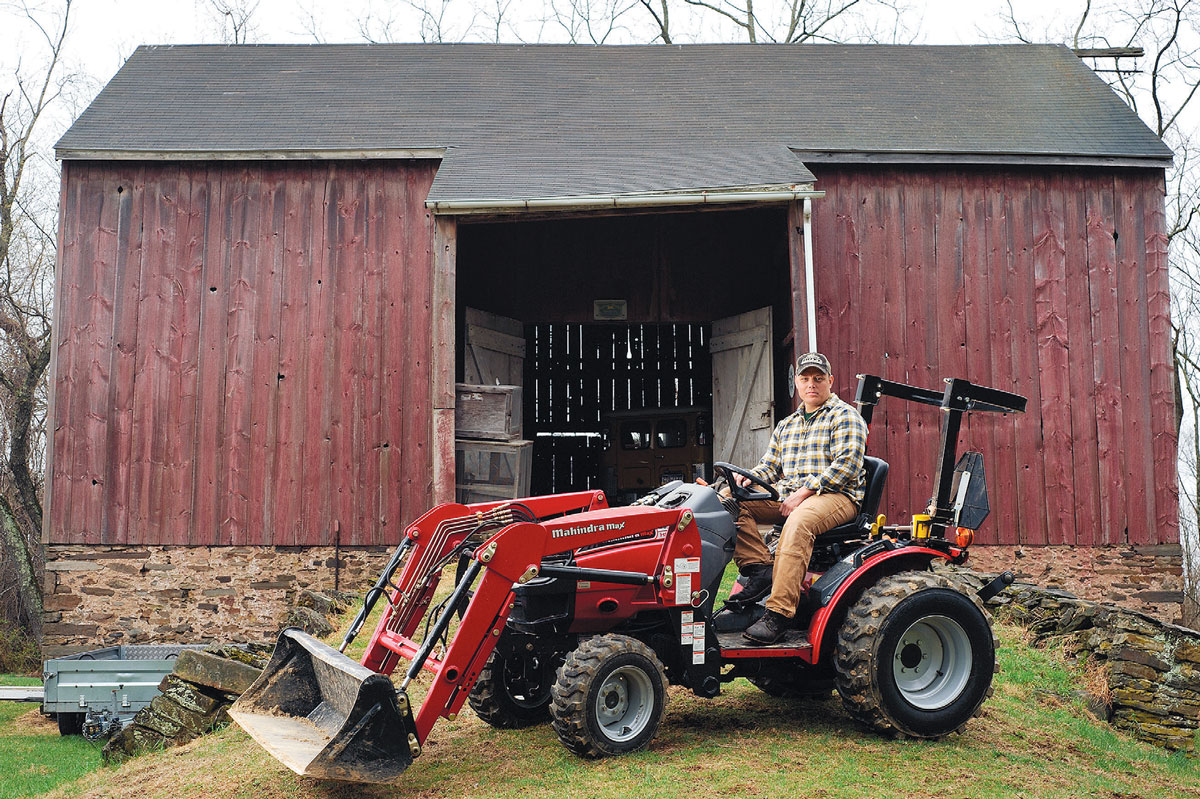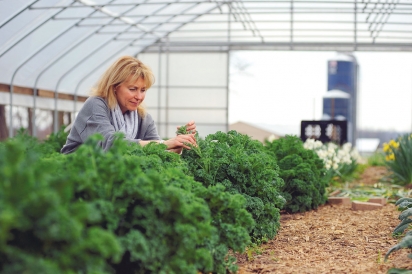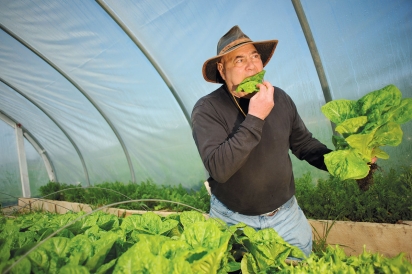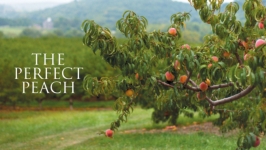Schooled on Farming
From the battlefield to the cornfield, soldiers are coming back to the land
Jim Wertman is itching to get his hands dirty. The retired U.S. Navy chief petty officer is planning to launch his own community-supported agriculture program on a portion of a 13-acre plot he owns near Doylestown, Pennsylvania. Wertman, who left the Navy in 2011 after more than two decades of service, aims to put his own spin on a typical CSA. His will be all about choice.
“Instead of giving you just vegetables,” he explains, “I will give members a credit, so they can pick the things they want. I can tailor my crops to what they really want that way, and will be able to track what it is they’re buying every week.”
Before Wertman starts tilling the fields, however, he’s got a few more credits to complete. Very much the modern farmer, the 43-year-old Wertman holds an MBA from Delaware Valley University, and soon will enhance his credentials by getting a certificate in organic farming from the school. The 36-credit, one-year program, which Delaware Valley created in partnership with the nonprofit Rodale Institute in 2013, is geared toward returning veterans like Wertman who want to pursue second careers in agriculture, and others who hear the call to farm.
The length and breadth of the Delaware Valley–Rodale organic farming program is unusual in that most agricultural schools offer either shorter six- to eight-week sessions or full bachelor’s degrees. Students spend two semesters in the classroom at Delaware Valley, taking part in practicums at area farms, and then wrap it all up with a 12- week stint at Rodale’s 333-acre property in Emmaus, Pennsylvania.
“This is much more intensive, with the combination of classes and real hands-on farming,” says “Coach” Mark Smallwood, executive director of the Rodale Institute, whose mission is to promote organic farming practices.
The program is part of Delaware Valley College’s role as a “yellow-ribbon” school, where veterans can apply their G.I. Bill benefits for tuition and housing assistance amid a supportive environment that includes a dedicated center for them, according to Thomas Kennedy, director of military and veteran affairs at the school. The rigor and discipline of farming match up well with military conventions, but farming can also help on an emotional level for those trying to restart their civilian lives. “Some veterans want to become farmers, because there’s something peaceful about growing,” Kennedy says. “It can help them reconcile issues from their combat days.”
With the average age of farmers nationwide approaching 60, the two-year-old initiative has a larger goal of trying to cultivate the next generation of growers. In Pennsylvania, the top industry is still agriculture, so there is great potential to restock the ranks of local farmers, too. Only a handful of students have completed the program so far, with some opting to remain at Delaware Valley for four-year degrees, but the goal is to graduate ten new farmers a year. “My tagline for farmers is, we can help you literally by bringing in the Marines,” Smallwood says.
Field of Study
It’s a bone-chilling, wet Wednesday in late winter, and the tree-lined campus of Delaware Valley is still buried under a blanket of snow. In horticulture professor Dr. Jackie Ricotta’s commercial vegetable production class, however, the talk is about summer tomatoes. Today’s lesson covers the practice of grafting tomato plants to strengthen them. First Ricotta, who teaches many of the core courses in the curriculum, shows a video giving an overview of the history of the practice, which has its roots in Japan and Korea, and its benefits.
Then it’s off to the university’s sprawling greenhouse complex, where students will try their hands at three grafting methods, pulling specimens from ten flats of small tomato plants. After the students get sufficiently comfortable slicing and splicing the tomato starts, they tend to their own “crops.” As part of the “Farmer’s Apprentice” project, each student is managing an indoor raised bed measuring about 10 feet by five feet, and must keep detailed records about what they grow, how they manage the plants and their yield. The idea is to connect students to one of the chief rewards of farming—getting to eat what you grow. “Some students have never had a garden,” Ricotta says.
It’s almost harvest time for many of the beds, with Wertman’s beginning to burst with kale, Swiss chard, radishes and other cool weather crops. “Farming has not really changed, except for the use of pesticides and chemicals,” he tells me. “Anyone could plant corn and let it grow, if you’re okay with spraying herbicides and pesticides. But organic really makes sense for health reasons—it’s really a good way to go.”
Besides the course on vegetable production, students get an overview of farming practices, with other classes covering such topics as organic food and fiber, integrated pest management and principles of sustainable agriculture. They also gain real-farm experience by doing several practicums with area farmers. In Wertman’s case, that has meant spending time at Doylestown’s Barefoot Gardens, a small-scale organic farm and CSA. “Being on a farm—especially a for-profit farm—is important,” Ricotta says. “They see the struggles, the good and the bad. Farming is a labor of love. You have to want to do it.”
Summer on the Farm
Having completed their course work at Delaware Valley, participants will spend this summer at Rodale learning almost everything you could want to know about organic farming in one location. Wertman and his classmates each will be rotating through seven disciplines, including livestock, vegetable and small-grain production, along with management of Rodale’s orchard of 1,100 certified-organic apple trees. Then they will have five weeks to focus on whatever excites them most. “We hope they will walk away saying it was the hog operation that piqued my interest, or I’m a vegetable guy or I’m a greenhouse guy—whatever suits their fancy,” Smallwood says.
A final key component is to find them work—the program has recently hired a coordinator to connect participants with farmers who are looking for help or potentially a successor for when they retire. According to Smallwood, with organic products enjoying double- digit growth over the past 15 years, it can be difficult for producers to keep up with the demand. Pennsylvania-based poultry producer Bell & Evans, for example, can no longer advertise that its animals are fed with 100% U.S. grain because there’s not enough domestic organic material available. “We know if we put this new generation out there, and they’re willing and able, selling organic products is not the problem,” Smallwood says.
Meanwhile, Wertman has begun developing the business plan for his Aro Hill Farm, whose name is taken from the Latin word meaning “to cultivate.” He intends to start small with a half-acre of crops and a little more than a dozen customers, ramping up the program over the next three to five years. His property also features an old stone farmhouse that’s being renovated for weddings and special events.
For Wertman, farming will allow him to leverage time management and leadership skills gleaned from the military without having to be stuck behind a desk all day. Plus, it turns out farmers and soldiers have several things in common, besides having to get up early in the morning.
“When you have a small organic farm, you’re not really competing with each other on a grand scale,” he says. “You’re open-minded and like to educate other farmers. That’s the way the military is. The theory is you can’t advance until you train the guys below you. Everyone is willing to help you and give their experience.”
For more information about the organic farming certificate program at Delaware Valley University, visit delval.edu/continuing-and-professional-studies/credit-certificate-programs/organic-farming-program.








